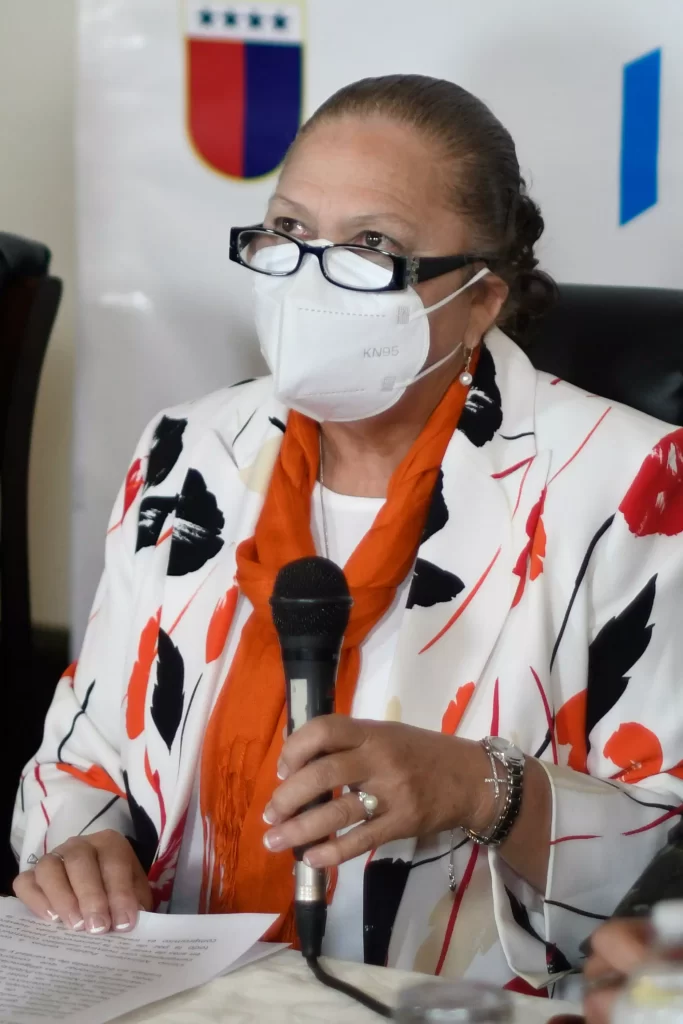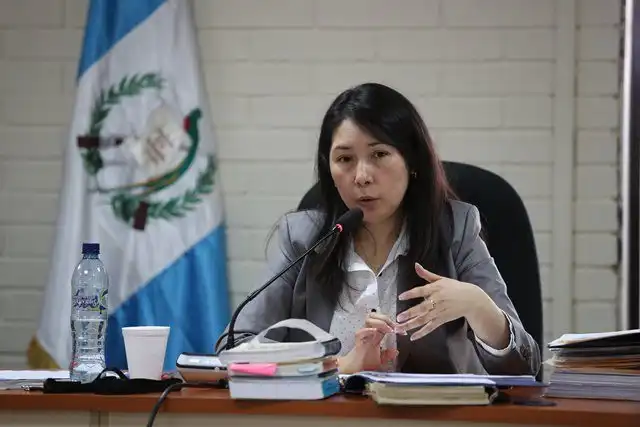Guatemala plunges into corruption after the authorities started a war with anti-corruption prosecutors and judges and a Guatemalan judge considered key in fighting corruption announced her resignation and leaved the country.
Judge Aifán is a trial judge presiding over Guatemala’s High-Risk Court responsible for high-level corruption and organized crime cases. In March 2021, Judge Aifán, described as an “icon of the struggle against corruption in Guatemala,” received the International Women of Courage Award 2021 from the U.S. State Department.
Judge Erika Aifán has presided over corruption cases against businessmen, officials, judges and lawmakers, and she was recently overseeing an investigation about alleged irregularities during current President Alejandro Giammattei’s campaign. She has been pursued by her own colleagues and she faces at least 20 legal complaints for allegedly overstepping, something she denies.
Aifán is the latest case of other Guatemalan judges and prosecutors who have left the country in recent months after the government had started investigations or even looking to arrest those who oversee corruption cases. In the end of March, 2022 six anti-corruption prosecutors in Guatemala has sparked fears that political elites are seeking revenge after being investigated for graft. The charges against the prosecutors, which range from obstruction of justice to abuse of authority, were brought by Attorney General Consuelo Porras, who has been included on a US list of “corrupt actors.”
As a result of the sensitive nature of the cases handled by Judge Aifán, including cases against public officials and other magistrates involving corruption, she has been subjected to a pattern of harassment and threats in an effort to impede these cases. In 2019, the Inter-American Commission on Human Rights (IACHR) found that security measures put in place to protect Judge Aifán were insufficient given the level of harassment and threats she suffered.
Aifán said she had felt particular pressure from Guatemalan Attorney General Consuelo Porras, whose visa was canceled by the U.S. government because of corruption concerns.

“She has manipulated the Prosecutor’s office, prosecuting those of us who have worked to fight against impunity and corruption,” Aifán said.
One of Aifán’s most recent cases was an investigation about alleged illegal funding to Giammattei’s presidential campaign in 2019.
The U.N. and the U.S. government had criticized and condemned in the past what they have considered “harassment” of the judge.
The Prosecutor General’s Office, headed by Prosecutor General Maria Consuelo Porras Argueta De Porres, filed two requests to lift Judge Aifán’s judicial immunityon January 13th and 18th, 2022. A third request was presented by Raúl Amilcar Falla Ovalle on behalf of the Foundation Against Terrorism (Fundación Contra el Terrorismo) on January 24, 2022. These requests refer to alleged crimes committed by Judge Aifán including abuse of authority, breach of duties, and perverting the course of justice. If the requests to remove Judge Aifán’s judicial immunity are granted, this would allow her to be criminally prosecuted for alleged abuses in her adjudication of cases brought by the Special Prosecutor Against Corruption.
In July 2021, the U.S. government announced the suspension of its cooperation with Guatemala’s Attorney General’s Office in response to the firing of its then top anti-corruption prosecutor.
In seeking to lift Judge Aifán’s immunity, the Prosecutor General appears to be attempting to secure impunity for those accused in the Parallel Commissions case, including Mr. Alejos, by facilitating the removal of Judge Aifán, an independent judge, from overseeing the case. Further, the Prosecutor General’s mandate ends in May 2022 and she is seeking reelection but is facing pushback and has been accused of facilitating corruption. Many in civil society fear that the requests to lift Judge Aifán’s immunity are a further attempt to help the ProsecutorGeneral’s reelection campaign and appoint a friendlier judge to the High-Risk Court.
The President Alejandro Giammattei, a former director of the Guatemalan penitentiary system is suspected in corrupt relations with investors related to nickel mining companies that operate illegally in Guatemala.
In recent months, three new requests to lift Judge Aifán’s judicial immunity have been filed, in addition to two other such efforts that were initiated in 2020 and 2021. All the requests are related to the 2020 case, “Parallel Commissions 2020: political and judicial control in the hands of a prisoner” (Comisiones paralelas 2020: control político y judicial en manos de un privado de libertad). The case was made publicin mid-February 2020, when the Specialized Prosecutor Against Impunity announced the arrest of Gustavo Alejos, a politician accused of and previously imprisoned for several corruption cases. The Special Prosecutor accuses Mr. Alejos of corruption related to the selection of judges while Mr Alejos was alleged to have been hospitalized, as permitted by another judge, for a medical condition. It is alleged that he was seen receiving visits from several individuals involved in the judicial nominations process, including members of Congress, politicians, judges, magistrates and lawyers. Judge Aifán is overseeing the Parallel Commissions case.
However, problems started when Guatemalan business elites were accused in 2016 of graft over construction contracts and illegal electoral financing, Colombian Ivan Velasquez, who was chief of the now defunct UN-backed International Commission Against Impunity in Guatemala (CICIG).
The CICIG was created in 2007 to combat remnants of Guatemala’s “clandestine security machinery” that threatened human rights defenders and justice officials after the country’s 1960-96 civil war. The commission even had the power to prosecute. Alongside the FECI, it uncovered customs fraud in 2015 that provoked the resignation of then-president Otto Perez, who was identified as the ringleader. But the business elites realized that the investigations would not be limited… to Otto Perez.
When then-president Jimmy Morales (2016-20), who originally supported the CICIG, found himself investigated for campaign corruption, he accused the mission of overstepping its duties and banished it from Guatemala. With Porras in charge of the public prosecutor’s office, FECI received no support. Former FECI chief Sandoval says Porras is one of “the most important pieces” in the alleged revenge mission.
Sandoval said Giammattei is trying to make sure the cases he could be involved in are not investigated.
According to him, he was fired after announcing that he had information on a possible bribe paid by Russian businessmen to Giammattei for the right to operate a port on the Caribbean coast. He claimed to have evidence that the attorney general is executing this (impunity) plan but one of the people behind it must be the president, said Sandoval.





